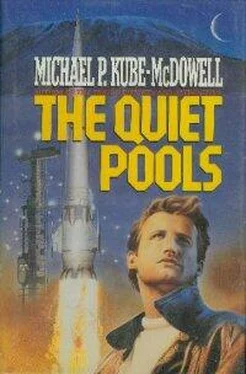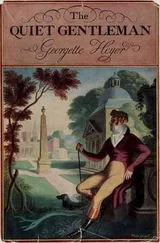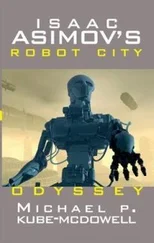Christopher swallowed any further words of indignation, and with them a measure of his pride. “What’s the timetable?”
“The sooner the better, I’d think. We’ll probably close late, but we might have to be more picky toward the end.”
Christopher nodded. “Okay. I’ll be in touch. Break, Dee.” He sat back in his big chair, thoughtful, troubled. Is that what it was about, this ache? Living forever? Edkins seemed to see so readily something Christopher had not yet acknowledged in himself. Edkins presumed an understanding Christopher wanted to deny.
Living forever . A little piece of immortality. A mark, more permanent than a handprint in cement, than initials carved on a wooden railway trestle. More permanent than memory. More permanent than life.
He circled the thought cautiously, unwilling to embrace it. He had scorned and pitied Jessie for this same passion. It was hard to be more forgiving of himself.
But already one part of his mind was thinking, Need to work on the middle eight — could use the date at Wonders—have to rent a v-cam, Greg can do tech — be nice to get some friends down for it —
“Ego and hypocrisy,” he chided himself aloud.
“Excuse me?” asked Dee.
“Ego and hypocrisy,” he repeated. “Not so different from Jessie, after all.”
Barely five minutes had passed when the phone cheeped again—little enough time that Christopher had barely found his place in the audit. Little enough time that he didn’t bother to glance at the Caller ID, automatically concluding it was Edkins calling back.
“I’ll take it, Dee,” he said.
But it was not Edkins, not a call he would have taken had he checked the identifier. It was, in fact, a call he had been avoiding.
“Hello, Christopher,” said William McCutcheon.
His father seemed to have a sixth sense for trouble in his life. Sure as sunrise, his father would call exactly when Christopher most wanted to avoid him—in the wake of crisis, calamity, or failure. Christopher half suspected his father of spying on him somehow, except he could not convince himself his father was sufficiently interested to take the trouble.
Probably it was just an accident of timing, a case of selective memory. All the same, the day after the blowup over John Fields, Christopher had directed his phone to divert any calls from William McCutcheon to V-mail. And true to form, in the two weeks since, there had been three such calls. Each time, his father had left an inconsequential message and an invitation to call back. Each time, Christopher had chosen not to do so.
It would not take William McCutcheon long to realize that he was being avoided. And Christopher should have known his father would not quietly accept that, would find a way to reach him.
Had.
Dee screened personal com everywhere—home, work, on the road. But Allied screened station com. Not that Christopher would have thought to post a divert on station com. His father had never called him at work before. Never in all the time Christopher had been in Houston.
“Hello, Father.” His father looked tired, and fatigue had always softened his features. Christopher saw more of himself in his father’s face at such times.
“Your friend Jessie says that you’re not often home these days,” said William. “She thought I might have the best chance to catch you here.”
William always spoke of “your friend Jessie” and “your friend Loi.” He refused to ratify the unconventional relationship by calling them Christopher’s wives, as most older people would, or even his mates, the style book compromise. In part, that was simple moral stodginess. In part, it was a commentary on the trine.
“It’s going to get worse before it gets better,” said Christopher, declining to ask the reason for the call. “ Memphis sails in six months.”
“So the nets tell me, with painful redundancy. Have you begun to think about what you’ll do when the ship is gone?”
There it was. Christopher looked at his father in surprise. “There’s Knossos to come, and Mohenjo-Daro and Teotihuacán after that. Allied will still need archies. There’ll be work here until long after I retire.”
“So you’re content to stay in Texas. I’m surprised. I would have thought you’d miss the woods more than you apparently do.”
“I miss them, all right. Here you get bone-dry baked or flash-flood drowned. But this is where my job is,” Christopher said, wondering. “I don’t have the option to work where I please. Operations isn’t about to allow dial-ups into the hyper. Not when a scissors virus could rip ten years work apart in ten minutes.”
“There are three inches of new snow on the ridge,” said his father.
A crystal memory of being ten and tracking deer and rabbits in the new snow suddenly flooded Christopher with unwelcome nostalgia. “You’ll have to send me a picture. They tell me it hasn’t snowed in Houston for sixteen years.”
“I was nearly in your backyard not too long ago,” he went on. “It seems that it was just as well that I didn’t follow my impulse to come all the way. I probably wouldn’t have found you there.”
Another surprise. “You were in Texas?”
“Not quite. I had to go down to Albuquerque a month or so back to look at some properties. That was the first long drive I’d taken in the Avanti. Long overdue to check the GPS navigator. I timed it so I flew across the Colorado River canyonlands at twilight. Ever seen them, Christopher?”
“Pictures.”
“Inadequate. Magnawall or stereo tank, it doesn’t matter. Inadequate.” A more familiar William McCutcheon, pronouncing his opinions with the authority of Truth. “A thousand meters up and a hundred klicks an hour, that’s the way to see the Colorado watershed. If I had come to Houston I would have dragged you back with me so I could show you.”
“I’ve been meaning to see it. But it’s not exactly our backyard,” said Christopher. “You’re probably closer to the Grand Canyon in Portland than we are here in Houston.”
“Make the time. Do it.” He shook his head. “Turquoise-blue lakes. Winding canyons like knife scars. Arrow-straight fault ridges. Physical poetry, Christopher. The mesa cliffs are fissured top to bottom like a giant cat clawed them. The rocks are blood red, like a spill of paint in the dust. And when the afternoon shadows move across them—you have to see it, Christopher.”
“It’s going to be awhile before I can think about taking sightseeing trips,” he said, a hint of impatience slipping into his voice. “I trust the Colorado’ll still be there when I get to it.”
“It’s changing, now that people can fly in so easily,” William said. “There are five times as many people in southeast Utah as there were thirty years ago. And they’re leaving their mark as surely as wind and water. Patches of irrigated green, self-contained houses on top of the mesas, little communities in the river valleys.”
“I’ll settle for almost virgin.”
“It made me think about the white pioneers on horseback, in wagons, on foot,” his father went on, “reaching Denver and seeing that wall of mountains. That anyone went farther west is a complete defiance of sanity. It’s astonishing to me that those lands were ever crossed, much less colonized. They’ve never been tamed.”
“Have you been to Denver? I’d have kept going, too,” Christopher said.
It was said lightly, a casual joke, but his father shook his head dismissively. “Crowding doesn’t explain it. Not the first wave. Economic factors don’t become meaningful until the second wave.”
“Maybe they kept going because it was hard.”
Читать дальше

![Nick Cracknell - The Quiet Apocalypse [= Island Zero]](/books/28041/nick-cracknell-the-quiet-apocalypse-island-zero-thumb.webp)










